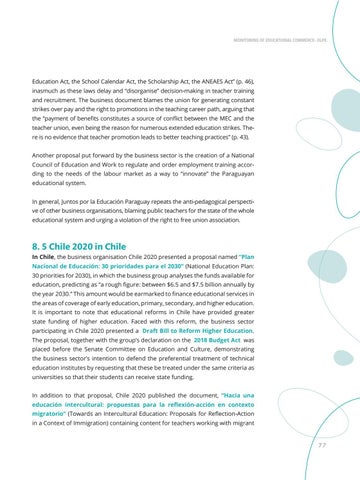MONITORING OF EDUCATIONAL COMMERCE- OLPE.
Education Act, the School Calendar Act, the Scholarship Act, the ANEAES Act” (p. 46), inasmuch as these laws delay and “disorganise” decision-making in teacher training and recruitment. The business document blames the union for generating constant strikes over pay and the right to promotions in the teaching career path, arguing that the “payment of benefits constitutes a source of conflict between the MEC and the teacher union, even being the reason for numerous extended education strikes. There is no evidence that teacher promotion leads to better teaching practices” (p. 43). Another proposal put forward by the business sector is the creation of a National Council of Education and Work to regulate and order employment training according to the needs of the labour market as a way to “innovate” the Paraguayan educational system. In general, Juntos por la Educación Paraguay repeats the anti-pedagogical perspective of other business organisations, blaming public teachers for the state of the whole educational system and urging a violation of the right to free union association.
8. 5 Chile 2020 in Chile In Chile, the business organisation Chile 2020 presented a proposal named “Plan Nacional de Educación: 30 prioridades para el 2030” (National Education Plan: 30 priorities for 2030), in which the business group analyses the funds available for education, predicting as “a rough figure: between $6.5 and $7.5 billion annually by the year 2030.” This amount would be earmarked to finance educational services in the areas of coverage of early education, primary, secondary, and higher education. It is important to note that educational reforms in Chile have provided greater state funding of higher education. Faced with this reform, the business sector participating in Chile 2020 presented a Draft Bill to Reform Higher Education. The proposal, together with the group’s declaration on the 2018 Budget Act was placed before the Senate Committee on Education and Culture, demonstrating the business sector’s intention to defend the preferential treatment of technical education institutes by requesting that these be treated under the same criteria as universities so that their students can receive state funding. In addition to that proposal, Chile 2020 published the document, “Hacia una educación intercultural: propuestas para la reflexión-acción en contexto migratorio” (Towards an Intercultural Education: Proposals for Reflection-Action in a Context of Immigration) containing content for teachers working with migrant
77
